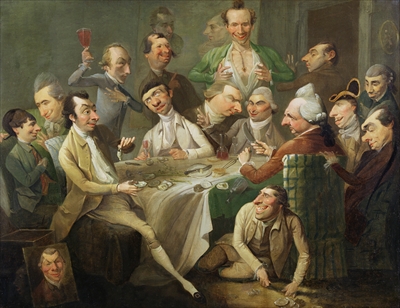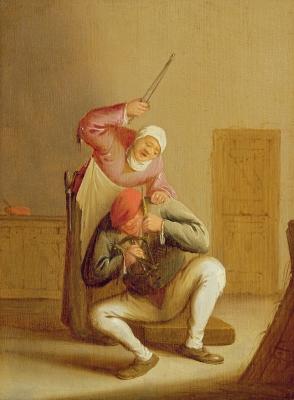Published 21/05/2016
Bridgeman's guide to popular phrases we all love to use, and where they came from.
|
Erm, she's no spring chicken. This saying is thought to have originated when farmers discovered that chickens born in the spring were far more desirable at market than older chickens that had lived through the winter. Sometimes a farmer would try to pass off a winter chicken as a young chicken, to which the buyer would respond "that's no spring chicken!" In Quentin Massys's 16th century portrait (rumored to be Princess Margaret of Tyrol), the painter depicted this woman as someone who clearly had seen better days. |

XIR2362 (detail) A Grotesque Woman, c. 1525-30 (oil on panel) by Quentin Massys/ National Gallery, London, UK |
|
Don't spill the beans. In other words don't confess the secret or disclose information prematurely. This phrase is though to come from ancient Greece when voting was done by a process of dropping, white, brown and black beans into candidates' jars. If you dropped in a white bean it meant you supported the candidate, while dark beans meant you were opposed to him. The results were to remain secret but occasionally a clumsy voter would knock over the jar and spill the beans - in other words, reveal the vote. |

BOU203107 Witness my Act and Deed, 1882 (oil on canvas) by Frank Paton/ Bourne Gallery, Reigate, Surrey |
|
When in Rome...(do as the Romans do) Although the original saying was coined by St. Augustine in the 4th century, the use of the saying in English is first recorded in Robert Burton's The Anatomy of Melancholy in 1621, "...like Mercury, the planet, are good with good, bad with bad. When they are at Rome, they do there as they see done..." In other words, do as the Romans do. For more tips on how to be a "good" tourist, take a look at illustrations from The Light Side of Egypt, a humorous book about upper class tourists in pre-WWI Egypt. |

STC361062 Stern Reality from 'The Light Side of Egypt', 1908 (colour litho) by Lance Thackeray/ The Stapleton Collection |
|
He's fallen off the wagon. To fall off the wagon means you've failed your attempt to give up any number of vices, but is traditionally used in reference to alcohol. It originated in the late 19th century, when America was awash in prohibition. Those who chose the sober life were said to be 'on the wagon.' The wagon was a water cart used to hose down dusty roads on hot days. Saying that a person was on the wagon was shorthand for "they would sooner climb aboard a water cart to quench their thirst" than have a drop of liquor. Now that's committment! |

CHE18114 Monks in a cellar, 1873 by J. Haier/ Cheltenham Art Gallery & Museums, Gloucestershire, UK |
|
They're armed to the teeth! In battle, it is best to be heavily armed. This phrase originated in the early 18th century Jamaica as a pirate term. Having only single shot black powder weapons and cutlasses, the men would carry many of these weapons at once so that they could keep up the fight without having to reload. In addition, many carried a knife in their teeth for maximum arms capacity. The image detail is from Pieter Bruegel's The Blue Cloak (right). Brugel's masterpiece is said to contain no less than 100 idioms, some familiar like 'banging one's head against a brick wall' and others such as 'casting roses before swine' which are from another time. |

BBC186461 (detail) The Blue Cloak, 1559 (oil on panel) by Pieter Bruegel the Elder/ Staatliche Gemaldegalerie, Berlin, Germany |
|
The cat's out of the bag. Similar to 'spilling the beans', to let the cat out of the bag is to reveal a secret or spoil a surprise. Traditionally though, the 'cat' is not usually a good surprise. In medieval England, piglets were sold in the open marketplace usually in a bag so it would be easier for the buyer to bring home. But shady sellers often tried to trick their buyers by putting a large cat in the bag. If a shrewd shopper peeked in the bag - then the cat was out of the bag along with the seller's deception. The shopper would then find a reputable vendor to get his pig, scratches and all. |

DTR352685 (detail) A Surprise Party, 1888 (oil on canvas) by John George Brown/ Detroit Institute of Arts, USA |
|
Go on, let your hair down! Letting one's hair down means to to let go of one's inhibitions. The origin of this saying is thought to be from the reign of Louis XIV in France, when it was popular among the elite classes to wear one's hair in elaborate up-do's or wear wigs. Hair was typically taken down only for washing or brushing as wearing one's hair down signified a lack of decorum or refinement. The only place to do so appropriately was at home where one could relax and be oneself. |

SZP367250 A saxophonist on horseback accompanied by three dancers, 1928 (b/w photo)/ SZ Photo, Scherl |
|
Oh, for the love of Pete! You may yell this phrase out of shear frustration or exasperation. The phrase and phrases like 'for Pete's sake' are euphemisms for 'for the love of God' or 'for Christ's sake' and hail from a time when those phrases were considered blasphemous. Why Pete? Most likely it is a reference to the Catholic Saint Peter. After all if you can't take it directly to the boss, why not take it up with the man he's given the keys to? |

NCO191279 Maniac Ravings, 1805 (hand-coloured etching) by James Gillray/ Warden and Scholars of New College, Oxford |
|
Mind your P's and Q's. If you are minding your P's and Q's you are alert and observant, monitoring your behavior and watching your language. In other words...behaving. Even early breweries had a rudimentary 'tab' system. Though not computerized, the barkeep had a chalkboard behind the bar where he would keep track of pints and quarts consumed by the patrons. When a well-watered patron became less than respectful of his bar mates, the barkeep may have said, "Mind your Ps and Qs". Translation? Pull yourself together or else! |

YBA146046 A Caricature Group, c. 1776 (oil on canvas) by John Hamilton Mortimer/ Yale Center for British Art, Paul Mellon Collection, USA |
|
The rule of thumb is... We've all been known to use this common saying and in modern times it has come to mean a typical or ubiquitous benchmark. The origin of the saying is said to come from the 17th century English Judge, Sir Francis Butler. Butler allegedly ruled that it was acceptable for a husband to beat his wife with a stick, given that said stick was no wider than his thumb. In the happy ending of Bridgeman's version of the story - Mrs. Butler exacts her revenge using a stick she neglected to measure beforehand. |

RAF81405 A Wife Beating her Husband (oil on panel) by Bartholomeus Molenaer/ Rafael Valls Gallery, London, UK |


